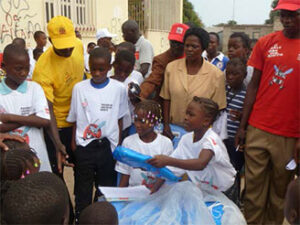
These enthusiastic school children distribute ITNs and educate recipients on how to hang their nets and the importance of sleeping under them every night. Source: Debra M. Prosnitz/MCHIP
In Angola, the NGO Ajuda de Desenvolvimento de Povo para Povo (ADPP) implements a school-based malaria control program in Zaire Province where malaria prevalence is high. PMI supports ADPP’s activities through a $1.5 million grant awarded through PMI’s Malaria Communities Program. The three-year program, run in cooperation with the Ministry of Education, covers all municipalities in the province and reaches about 100,000 people.
Some 12,000 school children from 200 schools across the province are organized into Malaria Control Patrols. At each school, a Malaria Control Teacher and Malaria Control Committee organize lessons and activities with the patrols. The students, who are in third to ninth grades, learn key messages about malaria: recognize the symptoms, seek treatment early, and sleep under an ITN. The patrols then pass these messages on to the wider community through information campaigns, open days, games, theatre, and song. An annual competition rewards the best students, teachers, and schools for their efforts to promote community control of malaria.
The Malaria Control Patrols have also distributed 40,000 ITNs, primarily for use by pregnant women and children under the age of five. Families are visited a number of times by a Malaria Control Patrol member who offers assistance and information on malaria, including how to use and care for the nets properly.
